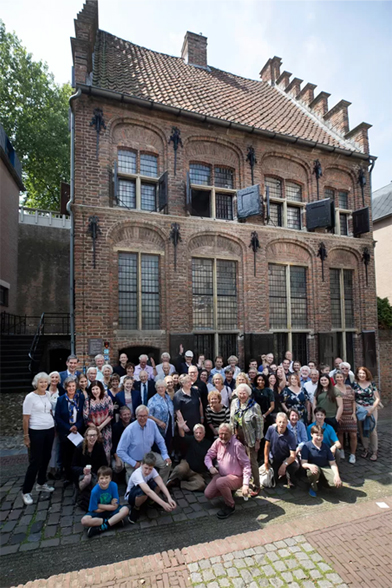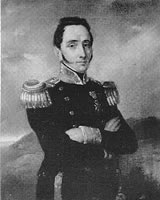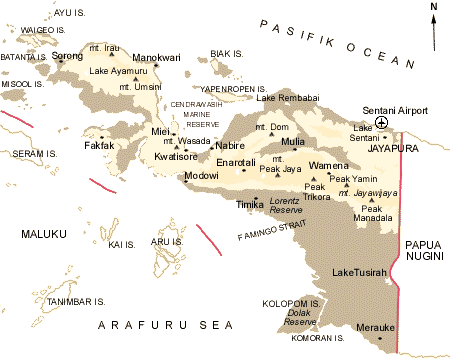Dirk Hendrik Kolff (1800-1843)

Een dienaar van het goevernement
In the Genealogy: Dirk Hendrik Kolff (B XIIIb)
Most Kolffs have earned their living either by trading, working for companies, or in free professions. This is still the case, in general. Few worked for gouvernments, as civil servants or in the military. Ofcourse there were exemptions of which the most spectacular are the six members of the oldest branch of the family, the Betuwe Kolffs (see also: Biographies: Deil). For 170 years, with an interruption of a mere twelve years, the municipality of Deil was gouverned by Kolffs, first as bailiff later as mayors. This was from 1804 untill the liquidation of this municipality which became then part of a larger entity. Were they civil servants? They can better be described as gouvernors in the region – in the best sense of its meaning.
And so there were only a few that choose a military career. One of them was Dirk Hendrik. That choice was obvious. His father, also a Dirk Hendrik, had climbed to the rank of naval captain, while the grandfather on his mothers’ side had even reached the rank of vice-admiral. So since 1814 he had joined the navy and, for its great prospects in opportunities there, he joined the service ‘following the advice of his guardians’ in the Neth. East Indies. He must have regretted that later. His 22-year carreer in the navy shows notable achievements but at the same time disappointment in the carreer he had hoped for.
Within a few years his qualities drew attention. Nelleke Manneke mentioned in her book the battles near Sumatra in 1821, for which he was awarded with Militaire Willemsorde 4e klasse (R.M.W.O.4), which is the highest in its class). In 1824 he was commanding, as lieutenant-commander ‘a colonial war brig of the first charter’. This ship was the Doerga, with which in 1825 and 1826 he explored the Eastern part of the Indonesian Archipelago. This voyage had the character of both exploration as well as colonial expansion. During his leave 1828 and 1829 in the Netherlands he published his “Reize door den weinig bekenden zuidelijken Molukschen archipel en langs de geheel onbekende zuidwest kust van Nieuw-Guinea … (translation: below) “, which was later also published in English. The King awarded him with a Gold Medal with inscription: “To award good behaviour and exceptional attempts to expand useful knowledge”. At the same time the Minister of Colonies and Navy informed him that he would be recommended ‘with special notice’ with the gouvernment in the Neth. East Indies.
Note: On father and son much has been written in Nelleke Manneke, Kolff in zeven eeuwen, Rotterdam 2001, 41-46.
Translation: Reize door (…) Nieuw-Guinea: “Journey through the little known Southern Moluccan Archipelago and along the entirely unknown Southwestern Coast of New Guinea”.
That had some effect. The Gouvernor-General appointed him as his aide-de-camp – an honour he shared with others – and, more important, after that gave him the task to set up and control a ‘Civil Navy’. This Civil Navy should then be able to abolish piracy in the Java Sea. In building this new service Kolff had a lot of freedom of activity. His approach had two main lines.
One was to build scooners and cruisers with little sea-going depth: they would cruise the seas along the coasts which would frighten the pirates, and this way protect civilians that were so often robbed and enslaved. Clear results of this approach became apparent in 1834. Some pirates were beaten, others were driven out of their bases, and deported to Java. In 1836 only a few sea-robberies and in 1837 none were reported. Small trade along the coasts of the Java Sea and around Banka revived, while more than a thousand coastal inhabitants that had been enslaved were freed and could return to their villages.
Secondly it was important to try to get the cooperation of the rulers that previously had allied themselves with the pirates. Mainly in the areas of the Riau archipelago and the Malacca Straits the rulers had to be tempted to follow the pacification policies of Batavia (Capital of the Neth. East Indies). At the same time it was important to get the cooperation of the British authorities in Singapore and Malaysia. For this D.H. Kolff was appointed ‘kommissaris’ (Commissioner), same as two subsequent Residents of Riau, Cornets de Groot and Goldman. This part of his plan was succesful too. Kolffs fellow Commissioners were both apponted at two more attractive Residencies than Riau, which already was not a bad place for a young Resident. Cornets de Groot was even awarded the Nederlandse Leeuw (R.N.L.).
Our Kolff, however, even though he managed to track down and free aprrox. 50 more enslaved Javanese, Madurese, and others, left the area with a broken health and not one penny wiser.
If the initial organization of the colonial navy – as in 1814 – had been maintained he would have become lieutenant-commander, Kolff expected, but this organization was abandoned, considered too expensive. Kolff became appointed in the lower rank of major in the newly erected Marines Corps of the Neth. East Indies. In 1837 he requested to be appointed Lieutenant-Colonel and commander of this corps. Cornets de Groot, now as General Secretary of the Neth. East Indies Gouvernment, sent him as a reply that this appointment could only be done by the gouvernment in The Hague. So after at first cost reductions got in his way, now he became victim of circumstances which he stated as follows in an appeal to the King in 1840: “The officers of the corps of the colonial navy don’t have superiors connected to the corps and as a consequence are deprived of support and advocacy at the Gouvernment.” (see below). Patronage at the Neth. Indies Navy was in the hands of the The Hague lobby, contrary to that of the Neth. Indies Interior Gouvernment, who appointed the Residents, for example. How well one functioned as a man in the tropical navy for appoinments of the higher ranks the officers in the Netherlands had better chances.
His health had become bad and he asked for leave to go tho Holland. Without any luck in 1839 and 1840 he tried to get his situation inderstood with the authorities. In 1840 his second wife died, some four years later he died as well. What an exiting man! But at the same time: what a sad story of misery in the service of the gouvernment! His son would not make himself dependant to the machineries of officialdom. He would do better being as owner of his sugarfactory.
Trade and industry, business in general or a free profession, it is probably not without reason that one finds most Kolffs there, and not in gouvernment.
Dirk Kolff, archivist
(translation to English: Marius Kolff)
| Original Dutch text of (part of) the appeal: “(..)de officieren van het vaste korps koloniale marine geen tot dat korps direct behoorenden chef hebben en alsoo van de noodige ondersteuning en voorspraak bij het Goevernement verstoken schijnen te zijn.” |
| The source of much of this text comes from a file at the National Archives at The Hague, which contains Kolff’s appeal to the King, dated 22 May 1840. P. Nouwt MA, who does a lot of research for the Kolff Family, has been so kind to point this file out to us. Reference is Algemeene Staatssecretarie en Kabinet des Konings, no. 6115. |
Kaap (Cape) Kolff is the name that was later given to Cape Kolff (however slightly different in lenghts/width/degrees): and that is known today as Tanjung Klop. (Tanjung Kolff, Kaap Kolff, and now Tanjung Klop) – S 7(gr) 22(min) 0(sec) & E 138(gr) 40(min) 0(sec). The name of New Guinea changed to Irian Barat/Irian Jaya, and is now Papua (present name for this Indonesian province). The Frederik Hendrik Eiland (island) is now known as Kolopom.
From “Aardrijkskundig en statistisch woordenboek van Nederlandsch Indië”, p. 271, by Peter Johannes Veth, published 1863 by P.N. van Kampen: Kolff-punt, name given by Lieutenant Kolff to the cape, located on the northern coast of ther Papua island of Frederik Hendrik, at 7(gr) 19(min) 45(sec) S.;
– Kolff-rivier, more inland, New Guinea, from the Frederik Hendrik Island;
– Kolff-droogte, (following Veth, 1863) “benaming van een zandplaatje tusschen Nieuw-Guinea en de Aroe-eilanden, gelegen op 7e N.Br. Het ontving den 26n April 1826 dezen naam van den Luitenant ter Zee, eerste klasse, D. H. Kolff, die er op dien dag over stevende met Z. M. brik Dourga. Deze droogte heeft 9 vademen water op zandgrond en 19 tot 20 vademen op moddergrond.”

